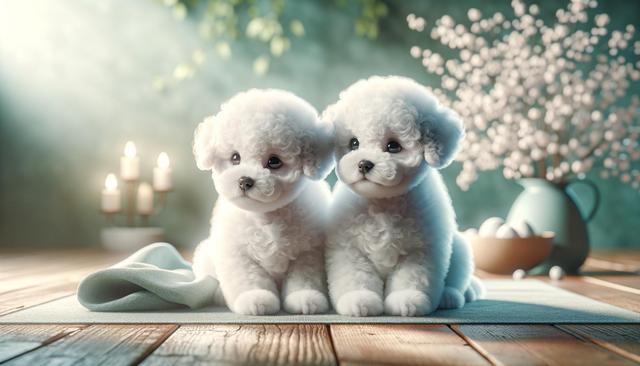The History and Origins of the Bichon Frise
The Bichon Frise, known for its white, curly coat and bright, expressive eyes, has a fascinating history that spans centuries. Believed to have originated in the Mediterranean region, this breed is a descendant of the Barbet, a water spaniel, and was later classified under the Barbichon family. The group includes several small, cheerful breeds that were highly popular among European nobility. Over time, the Bichon Frise became a favored companion in France, Spain, and Italy, often seen in royal courts and aristocratic homes.
Despite their noble beginnings, Bichon Frises nearly disappeared during difficult historical periods, including the French Revolution. Fortunately, their charm and affectionate nature helped them endure. Street performers and organ grinders often used Bichons in shows due to their intelligence and trainable nature, helping to maintain their population. In modern times, the breed has gained popularity as a household companion, admired for its friendly disposition and manageable size.
These historical roots contribute to the breed’s personality, making Bichon Frise puppies naturally sociable and adaptable. Their background as companions to royalty and performers alike has shaped a dog that thrives in human company and enjoys being part of the family dynamic.
Physical Characteristics and Grooming Requirements
Bichon Frise puppies are known for their soft, white, hypoallergenic coats that require consistent grooming to maintain their appearance and health. Their fluffy, cloud-like fur does not shed in the same way as many other breeds, which can make them a suitable choice for some allergy-sensitive households. However, this also means that regular grooming is essential to prevent matting and skin issues.
Key physical traits of the Bichon Frise include:
- Compact size, typically weighing between 10 to 18 pounds as adults
- Rounded skull and dark, expressive eyes
- Curly, double coat that gives them a plush appearance
Grooming routines should ideally include:
- Daily brushing to prevent tangles and mats
- Professional grooming every 4 to 6 weeks
- Regular ear cleaning and nail trimming
- Bathing as needed, using dog-safe shampoos
While grooming can be time-consuming, it offers a chance to bond with your puppy and keep them looking and feeling their best. Many owners find the effort worthwhile for the joy and companionship these pups bring.
Temperament and Behavior Traits
Bichon Frise puppies are often described as cheerful, affectionate, and playful. Their temperament makes them excellent family pets, well-suited to a variety of living situations, from apartments to larger homes. They typically get along well with children and other pets, especially when socialized early.
Some defining behavioral characteristics include:
- Sociable nature – they crave human interaction and dislike being left alone for long periods
- Playfulness – energetic and quick to engage in games or short bursts of activity
- Intelligence – responsive to training and capable of learning commands and tricks
However, their strong desire for companionship can lead to separation anxiety if not addressed early. Crate training and gradual independence exercises can help mitigate this. Positive reinforcement training methods work best, as Bichons tend to be sensitive to harsh corrections. Their eager-to-please attitude makes them a joy to train, especially for first-time dog owners.
Proper socialization and consistent routines help shape a well-behaved adult dog. Introducing your puppy to different environments, people, and experiences in a calm and supportive way lays the foundation for a confident, friendly pet.
Health Considerations and Lifespan
Overall, Bichon Frise puppies grow into generally healthy dogs with a lifespan ranging from 12 to 15 years. As with any breed, there are some common health concerns to be aware of, especially when choosing a breeder or planning for long-term care.
Some conditions that may affect Bichon Frises include:
- Allergies and skin sensitivities
- Dental issues due to small mouth size
- Joint conditions such as patellar luxation
- Bladder infections and stones
Regular veterinary check-ups, a balanced diet, and proper dental hygiene can help prevent or manage these concerns. Many breeders now conduct health screenings to minimize the risk of passing on hereditary conditions, making it important to seek out responsible breeding practices.
Nutrition also plays a vital role in the overall health of your puppy. A diet formulated for small breeds with appropriate levels of protein, fat, and essential vitamins will support growth and development. Avoiding overfeeding and ensuring proper exercise can help maintain a healthy weight and reduce strain on joints over time.
By staying proactive with health care and monitoring for any signs of discomfort or behavioral changes, owners can help their Bichon Frise enjoy a long, active life.
Is a Bichon Frise Puppy Right for You?
Choosing a Bichon Frise puppy involves more than falling for their adorable appearance. These pups thrive in homes where they receive plenty of attention, mental stimulation, and physical activity. If you’re someone who enjoys grooming routines and spending quality time with your pet, a Bichon Frise may be a rewarding match.
Ideal characteristics of a Bichon-friendly household include:
- Time and availability for daily interaction
- Willingness to maintain grooming needs
- A calm and gentle approach to training
- Preparedness for long-term commitment and care
Bichons are adaptable to different living environments, making them suitable for both city and suburban life. However, they do require regular playtime and short walks to keep them mentally and physically engaged. Their friendly nature also makes them excellent therapy or emotional support animals with proper training.
Before bringing a Bichon Frise puppy home, it’s important to assess your lifestyle and ensure you’re ready for the responsibilities of pet ownership. Visiting reputable breeders or adoption centers can provide insight into the breed and help you find a puppy that meets your expectations and lifestyle needs.
Conclusion: Welcoming a Bichon Frise into Your Life
Bichon Frise puppies bring joy, energy, and affection to households ready for their lively personalities and unique care needs. With consistent grooming, social interaction, and proper training, these pups grow into loving companions that thrive in human company. Whether you’re a first-time dog owner or an experienced pet parent, the Bichon Frise offers a fulfilling and warm-hearted addition to any home. Taking the time to understand their needs ensures a lasting bond and a happy life together.




Leave a Reply